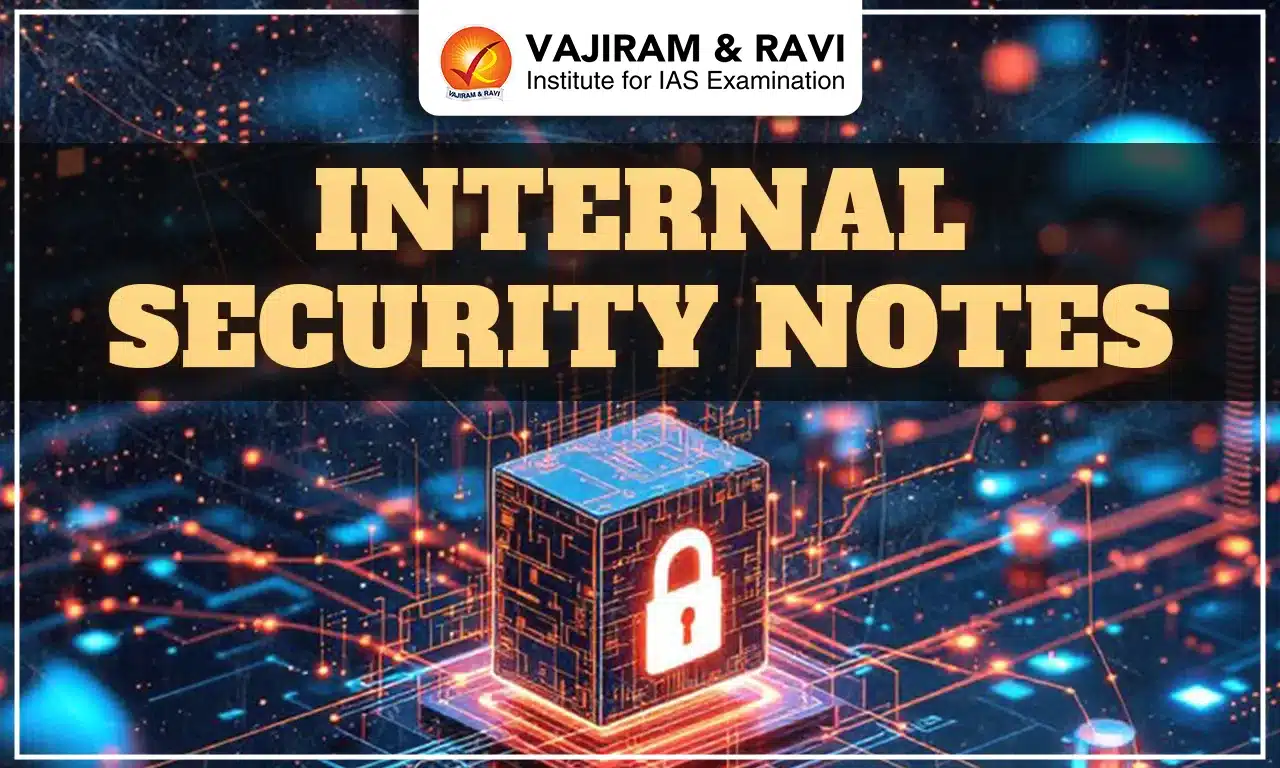National Security Act, 1980 (NSA) is a significant Indian law aimed at preventive detention concerning matters of national security and public order. This act permits limitations on individual freedom and preventive detention for the sake of public safety and order.
Despite its intended purpose of preventing potential threats, the National Security Act has faced criticism for its potential for abuse and violations of fundamental rights, sparking debates about necessary reforms to ensure a judicious balance between national security imperatives and individual rights.
National Security Act, 1980 Overview
National Security Act (NSA), 1980, is a preventive detention law that allows the central and State Governments to detain individuals without formal charges or trial. Enacted by the Indian parliament on September 23, 1980, it empowers authorities to detain individuals without formal charges for up to 12 months, extendable with fresh evidence.
- Historical Background: The National Security Act traces its roots to colonial-era laws like the Bengal Regulation III (1818), Defence of India Act, 1915 and the Rowlatt Act, which enabled arbitrary detentions
- Post-Independence: After independence, the Preventive Detention Act (1950) was enacted, expiring in 1969. The Maintenance of Internal Security Act (MISA), enacted in 1971, was repealed in 1978 after widespread criticism for its misuse during the Emergency (1975–1977). The NSA, introduced in 1980, aimed to balance security with safeguards.
National Security Act, 1980 Objectives
National Security Act, 1980 aims to prevent a person from engaging in any activity that could jeopardise national security. The government may detain an individual to prevent any potential threat or disturbance to public order.
- Under normal circumstances, an arrested person has rights, including being informed of the reason for arrest, the right to bail, court appearance within 24 hours, and legal counsel.
- However, under the NSA, these rights are suspended, allowing for detention without disclosure of reasons for up to 10 days and no legal representation before an advisory board.
National Security Act Constitutional Framework
Article 22(3)(b) of the Indian Constitution permits the use of preventive detention laws, allowing limitations on personal freedom in the interest of maintaining state security and preserving public order. However, Article 22 (4) states that preventive detention cannot exceed three months unless an Advisory Board, comprising qualified judges, deems it necessary.
National Security Ac (1980) Provisions
National Security Act (NSA), 1980 empowers the government and law enforcement agencies to take preventive action in certain cases to maintain national security. The National Security Act of 1980 includes several key provisions:
- Power of Detention: The National Security Act authorises both central and state governments to detain individuals who are disrupting public order or obstructing the delivery of essential supplies and services to the community.
- Grounds for Detention: Individuals are detained when there is prejudice against India's defence, relationship with foreign nations, or security. It can also be used to prevent someone from acting in a way that jeopardises the community's ability to maintain essential supplies and services.
- Detention Period: The NSA Act allows for preventive detention, where an individual can be detained without charge for up to 12 months. The government may extend the detention if it determines that the individual continues to pose a threat.
- Advisory Boards: For the National Security Act, the Central Government and each State Government shall establish one or more Advisory Boards, as needed.
- An advisory board must review the detention within three months of the date of detention.
- The board, consisting of three members who are qualified to be High Court judges, must report whether there is sufficient cause for the detention.
- Appeal: The detainee may appeal to a high court advisory panel, but he or she is not permitted to have a lawyer present during the trial.
- Protection of Action Taken in Good Faith: No suit, prosecution, or other legal proceeding shall lie against the appropriate authority or any person for anything done or intended to be done in good faith under this Act.
- Temporary Release: The appropriate government may direct that any person detained following a detention order be released for any specified period, either without conditions or subject to such conditions specified in the direction as that person accepts, and may, at any time, cancel his release.
National Security Act (1980) Significance
National Security Act's Significance lies in empowering the government to preventively detain individuals who pose threats to national security or public order, ensuring proactive measures against potential disruptions and maintaining internal stability.
- Preventive Detention: The NSA Act allows for the detention of individuals to prevent actions that could harm national security or disrupt public order. For instance, the act has been used to detain Kashmiri politicians in the context of Article 370 of the Indian Constitution as a preventive detention measure.
- Deterrence: The possibility of being detained under the NSA can deter individuals from engaging in activities that could harm national security or public order.
- Special Powers for Sensitive Regions: The NSA grants special powers to authorities in sensitive regions, such as border areas or areas prone to terrorism, allowing them to act swiftly and decisively to maintain peace and security.
- Balancing National Security and Civil Liberties: It represents a delicate balance between safeguarding national security interests and ensuring the protection of civil liberties.
National Security Act 1980 Criticism
National Security Act is criticised for enabling arbitrary detentions without trial, lacking transparency and accountability, and being misused against activists and minorities, thereby raising concerns over civil liberties and human rights.
- Arbitrary Detention: The Act has been widely criticised for vesting the government with arbitrary power, which is frequently abused by the authorities. Authorities may misuse it to stifle opposition or target political adversaries.
- Against the Principle of Natural Justice: Some critics argue that the Act violates Article 22 of the Constitution and various provisions of the Criminal Procedure Code that protect an arrested person's rights.
- For example, the arrested person is required by the CrPC (Bharatiya Nagarik Suraksha Sanhita) to appear before the nearest Magistrate within 24 hours, but the NSA makes an exception.
- Lack of Transparency: The opaque nature of the detention process under the NSA makes it challenging to monitor and prevent human rights abuses.
- Absence of Data: National Crime Records Bureau (NCRB) does not include cases under the NSA Act in its data because no FIRs are registered. As a result, no precise figures for the number of detentions under the NSA are available.
- Violation of Fundamental Rights: It opens the door to serious violations of the detained person's constitutional rights. For example, a person can be detained for up to three months without the executive authority's decision being reviewed by the Advisory Board. The detainee may be subjected to unlawful torture or abuse during the three months.
- Low Conviction Rates: Many detentions under this act have not led to convictions, indicating a potential misuse of the law or the lack of substantial evidence to justify the prolonged detention. For example, in 2021, the Allahabad High Court quashed 94 out of 120 orders under the NSA.
National Security Act 1980 Way Forward
National Security Act 1980 Way Forward involves ensuring transparency, periodic judicial reviews, and legislative reforms to prevent misuse, protect civil liberties, and balance national security needs with constitutional safeguards for individual rights.
- Stronger Judicial Oversight: Implementing stronger judicial review mechanisms can ensure that detentions under the NSA are subjected to rigorous scrutiny, preventing arbitrary or politically motivated detentions.
- Reforms Through Amendment: Certain provisions of the NSA, such as those stating that detainees have no right to be represented by a legal representative before the Advisory Board, must be amended.
- Introduce Sunset Clauses: NSA does not have a sunset clause. To prevent prolonged incarceration without trial, the duration of detention should be limited or reviewed periodically.
- Protecting Civil Liberties: Balancing security measures with the protection of civil liberties is crucial. Any reform should prioritise safeguarding fundamental rights, including freedom of expression and the right to a fair trial.
- Enhance Transparency: Increase public access to information about NSA detentions, including reasons for arrest and details of the detention process.
Last updated on February, 2026
→ UPSC Notification 2026 is now out on the official website at upsconline.nic.in.
→ UPSC IFoS Notification 2026 is now out on the official website at upsconline.nic.in.
→ UPSC Calendar 2026 has been released.
→ Check out the latest UPSC Syllabus 2026 here.
→ Join Vajiram & Ravi’s Interview Guidance Programme for expert help to crack your final UPSC stage.
→ UPSC Mains Result 2025 is now out.
→ UPSC Prelims 2026 will be conducted on 24th May, 2026 & UPSC Mains 2026 will be conducted on 21st August 2026.
→ The UPSC Selection Process is of 3 stages-Prelims, Mains and Interview.
→ Prepare effectively with Vajiram & Ravi’s UPSC Prelims Test Series 2026 featuring full-length mock tests, detailed solutions, and performance analysis.
→ Enroll in Vajiram & Ravi’s UPSC Mains Test Series 2026 for structured answer writing practice, expert evaluation, and exam-oriented feedback.
→ Join Vajiram & Ravi’s Best UPSC Mentorship Program for personalized guidance, strategy planning, and one-to-one support from experienced mentors.
→ UPSC Result 2024 is released with latest UPSC Marksheet 2024. Check Now!
→ UPSC Toppers List 2024 is released now. Shakti Dubey is UPSC AIR 1 2024 Topper.
→ Also check Best UPSC Coaching in India
National Security Act (1980) FAQs
Q1. What are the main objectives of the National Security Act?+
Q2. What is the NSA Act punishment?+
Q3. What is the maximum period of detention under the National Security Act 1980?+
Q4. What is Section 9 of the National Security Act 1980?+
Q5. What is the full form of MISA?+
Tags: national security act quest UPSC Internal Security Notes


















